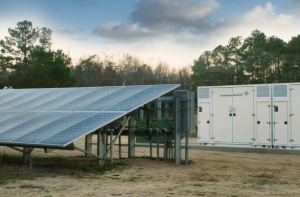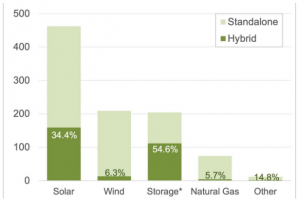
A solar-plus-storage installation in North Carolina. More than one-third of the solar in the interconnection queues is proposed as a hybrid plant. Image: Lockheed Martin.
A record amount of solar capacity and energy storage is currently in US transmission interconnection queues, according to a new study from Lawrence Berkeley National Laboratory (Berkeley Lab).
At 462GW, solar accounts for most of the total generator capacity in the queues, which reached a record of more than 755GW and an estimated 200GW of storage capacity at the end of 2020. To put that in perspective, the US had 1,117GW of utility-scale electricity generating capacity in operation last year.
Proposed large-scale electric generation and storage projects must apply for interconnection to the bulk power system via interconnection queues. Berkeley Lab said that while many projects that apply for interconnection are not subsequently built, data from the queues provide a general indicator for mid-term trends in developer interest.
The laboratory, which is supported by the US Department of Energy, analysed data from seven independent system operators (ISOs) and regional transmission organisations, in addition to 35 utilities not in ISO regions, representing an estimated 85% of all US electricity load.
Solar capacity in the queues is distributed across most regions, including most notably PJM (89GW), the non-ISO West (88GW), ERCOT (65GW), MISO (64GW), Southeast (57GW) and CAISO (47GW).

Capacity (GW) in queues at end of 2020. Image: Lawrence Berkeley National Laboratory.
The data also indicates growing interest in hybrid plants that combine multiple generation types and/or storage at the point of interconnection. At least 159GW of the solar in the queues is proposed as a hybrid plant, representing more than one-third of all solar in the queues.
An estimated 112GW of battery capacity is proposed in hybrid configurations with generation, representing 55% of all storage capacity in the queues. Berkeley Lab found that interest in hybrids is most prominent in CAISO and the non-ISO West, where 89% and 67% of the cumulative proposed solar is in a hybrid configuration, respectively – a trend that is said to be accelerating.
The research suggested that completion percentages have been declining in recent years and are lower for wind and solar than for other resources. Meanwhile, wait times are on the rise: in four ISOs, the typical duration from connection request to commercial operation increased from ~1.9 years for projects built in 2000 – 2009 to ~3.5 years for those built in 2010 – 2020.
Despite the record capacity in the queues, much will not ultimately be built, Berkeley Lab said. Looking back at a subset of queues for which data are available (CAISO, ISO-NE, MISO, NYISO, and PJM), only 24% of the projects seeking connection from 2000 to 2015 subsequently reached commercial operations.
The research follows another recent Berkeley Lab study which found that standalone battery storage can offer better value to the US electricity system than batteries paired directly with solar generation.





